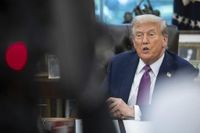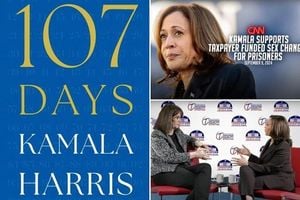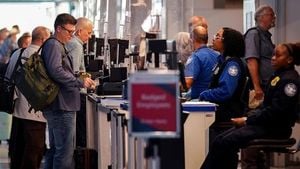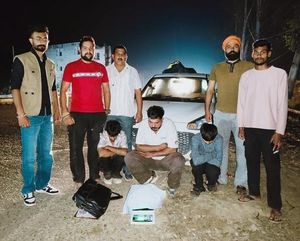On September 4, 2025, the District of Columbia took the extraordinary step of filing a federal lawsuit to halt President Donald Trump’s deployment of the National Guard during law enforcement operations in Washington. Describing the arrival of hundreds of troops as an “involuntary military occupation,” D.C. Attorney General Brian Schwalb argued that the move amounted to an illegal use of the military for domestic law enforcement—a charge that’s reignited debate over presidential authority and the limits of federal power in the nation’s capital.
This legal challenge comes on the heels of a similar ruling in California, where a federal judge recently found Trump’s deployment of the National Guard to Los Angeles illegal following protests over immigration raids in June. The Trump administration is appealing that decision, yet it’s important to note that the California ruling doesn’t directly apply to Washington, D.C. Unlike states, where governors command the Guard, the president has far more direct control over the D.C. National Guard. That distinction, legal experts say, could make all the difference in the outcome of the District’s lawsuit.
According to Politico, the controversy comes at a time when Trump’s job approval rating sits at 44 percent, with 56 percent of Americans disapproving, as per a CBS News/YouGov poll released on September 7, 2025. While those numbers may seem middling, Trump’s standing among Republicans has surged to 91 percent, a jump attributed to his hardline stances on immigration, deportation, and crime. For many in his base, these issues “far outpace inflation and the economy as their most important metric,” CBS News’ Anthony Salvanto and colleagues report.
Yet, the broader public remains skeptical of Trump’s domestic military deployments. CBS News polling found that 57 percent of Americans oppose sending the National Guard into Washington, D.C., 58 percent oppose deployments to other cities, and 61 percent would oppose having troops sent to their own local area. Despite this opposition, some analysts suggest that the president’s high-profile actions have served to shift media attention away from persistent economic concerns such as inflation—a move that may offer political benefits even as it stirs controversy.
The political theater reached a fever pitch on September 6, when Trump posted a provocative meme on Truth Social. The image reimagined Francis Ford Coppola’s 1979 Vietnam War epic Apocalypse Now, superimposing Trump’s face over Robert Duvall’s character. Military helicopters hovered over the Chicago skyline; an explosion raged in the background. The meme was emblazoned with the phrase: “I love the smell of deportations in the morning,” a play on Duvall’s famous line about napalm. The tagline warned, “Chicago about to find out why it’s called the Department of WAR,” and the movie’s title was recast as “Chipocalypse Now.”
This post sent shockwaves through Chicago and beyond. According to The New York Times, thousands of demonstrators took to the streets of downtown Chicago in protest of Trump’s threats and the looming prospect of federal intervention. One protester told the NYT, “Honestly, what made me realize I needed to be here was when I saw Trump’s social media post this afternoon. I was on the fence, and then I saw he was declaring war on an American city, my city.”
Chicago’s elected officials wasted no time in responding. Illinois Governor JB Pritzker declared, “This is not a joke. This is not normal.” Representative Mike Quigley described the president as a “true tyrant” in comments to Politico, while Senator Dick Durbin added, “I take it very seriously that he is instilling fear in the hearts of a lot of people. That is his intention, and it’s working.”
Despite the uproar, the White House remained defiant. Spokesperson Abigail Jackson told Politico, “Eight people were killed and over 50 people were wounded last weekend in Chicago but local Democrat leaders are more upset about a post from the President. That tells you everything you need to know about the Democrats’ twisted priorities and why Chicago has had the most murderers of any US city for 13 consecutive years.”
Back in Washington, D.C., the city’s mayor, Muriel Bowser, found herself walking a political tightrope. As The Washington Post reports, Bowser has tried to balance her responsibilities as the city’s chief executive while avoiding direct confrontation with the White House. But her options are limited: even after Trump’s official 30-day deployment period expires, Bowser remains largely powerless to stop roadside checkpoints and raids by Immigration and Customs Enforcement agents. National Guard troops are expected to patrol the city for months to come.
The deployment has also exposed stark differences in how various parts of D.C. experience federal intervention. Residents in Anacostia, for example, have told the Associated Press that they would like to see more resources devoted to fighting crime, but they haven’t noticed the same National Guard presence as in the city’s tourist districts.
Meanwhile, on the national stage, Trump’s tough-on-crime rhetoric continues to drive a wedge between supporters and critics. While some Republicans see the deployments as a necessary response to urban violence, Democrats have condemned them as overreach and a threat to civil liberties. Senator Tammy Duckworth of Illinois said on CBS’s “Face the Nation,” “Let’s make it clear the president of the United States essentially just declared war on a major city in his own nation. This is not normal … This is not acceptable behavior.” Duckworth also clarified that there were no indications of troops being readied for deployment into Chicago, despite the president’s rhetoric.
Others in Trump’s orbit have tried to downplay the president’s words. Border czar Tom Homan told CNN’s “State of the Union,” “I think it’s words being taken out of context. If I said we’re going to war, we’re going to war with the criminal cartels, we’re going to war with illegal aliens.” But for many, the administration’s tone has only heightened anxieties about the militarization of domestic law enforcement and the erosion of democratic norms.
As the legal battle over the National Guard’s deployment in Washington unfolds, the outcome may hinge on the unique status of the District and the president’s broad authority over its Guard units. Yet the broader questions raised—about the use of military force in American cities, the balance of power between federal and local governments, and the political calculation behind such moves—are likely to reverberate well beyond the courtroom.
For now, cities like Washington and Chicago remain on edge, caught between presidential power plays and the growing demands of their citizens for safety, justice, and respect for democratic traditions. The coming months will test not just the legal limits of executive authority, but also the resilience of American civic life itself.





